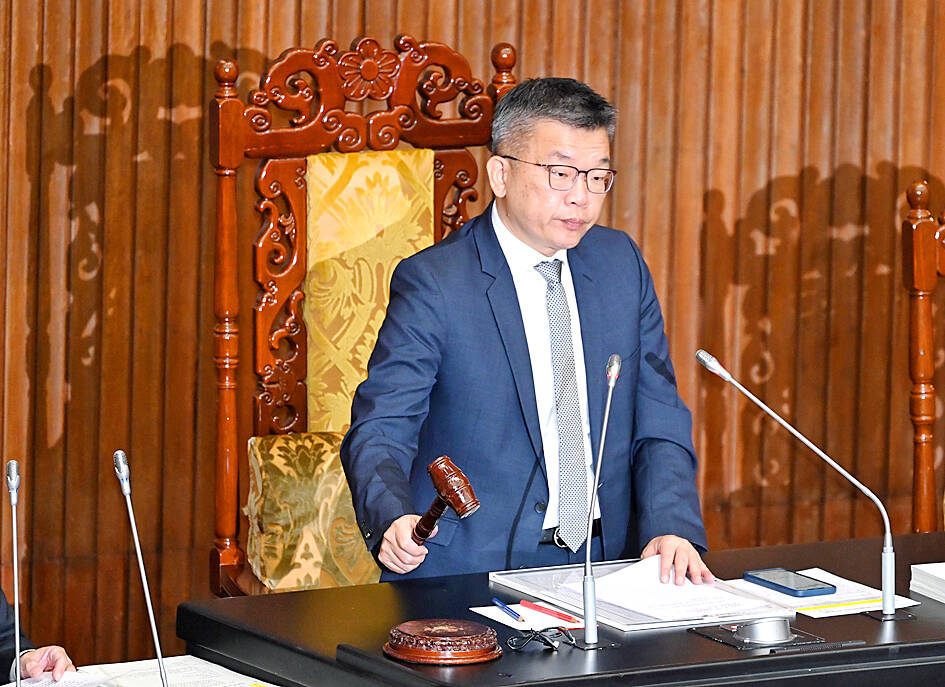Civil servants would not receive a promotion if they get a demerit for drunk driving, sexual harassment or stalking in the year before their annual performance evaluation after the Legislative Yuan yesterday passed an amendment to the Civil Service Promotion Act (公務人員陞遷法).
The bill is designed to refine the promotion system for civil servants and would reinforce the principle of a merit-based promotion system, said the Examination Yuan, which proposed the amendment.
Following the passage of the bill, civil servants should be promoted solely based on merit, instead of on seniority and merit.

Photo: Liu Hsin-de, Taipei Times
Civil servants who win awards, achieve outstanding job performance and demonstrate high proficiency in specific languages would score extra points in the performance evaluation.
Meanwhile, civil servants who are on maternity leave and voluntarily accept a position with a lower rank would be waived from a screening procedure when they return to work, the bill says.
The bill also removes the rules in the act that prevent the government from considering for promotion civil servants who have been in their job for less than one year, but it adds new rules that ban those who receive a demerit because of driving while intoxicated, sexual harassment and stalking from being considered for promotion.
Separately, an amendment to the Plant Variety and Plant Seed Act (植物品種及種苗法) secured a third reading yesterday.
The bill authorizes the Council of Agriculture to list plant seeds that are banned from being exported to or imported from other nations. Crops and processed food made by the regulated seeds are subject to the same ban.
Individuals who contravene the ban could be sentenced to up to three years in prison and fined NT$600,000 to NT$3 million (US$19,492 to US$97,460). Seeds, crops and processed food would also be confiscated.
The council proposed the bill after China announced that it had successfully grown golden diamond pineapples, which were developed and produced in Taiwan. China in 2021 banned imports of Taiwanese pineapples.
“Taiwan owns advanced technology in increasing varieties of fruits and plants, as such multiple varieties of pineapples can be seen in Taiwan. Pineapples have emerged as the symbol of Taiwan’s agriculture industry,” Council of Agriculture Minister Chen Chi-chung (陳吉仲) said.
However, The Economist last week reported on how China stole agricultural technology from Taiwan and produced the pineapples in Hainan Province, he said.
“The report also exposed China’s two-handed strategy: banning the importation of Taiwanese pineapples on the one hand, and on the other hand stealing the pineapple varieties developed by Taiwan and naming them Chinese pineapples. The report showed that Taiwan is facing the challenge of China’s intellectual property rights infringement and undue competition in export markets,” Chen said.
“The amendment would enable the council to impose stricter measures to protect plant seeds. To protect our competitive edge in the export market, the Japanese Ministry of Agriculture, Forestry and Fisheries has issued a temporary restraining order to block the importation of golden diamond pineapples grown in China while we apply for a patent for the pineapples,” he said.

Palauan President Surangel Whipps Jr arrived in Taiwan last night to kick off his first visit to the country since beginning his second term earlier this year. After arriving at Taoyuan International Airport at around 6:30 pm, Whipps and his delegation were welcomed by Minister of Foreign Affairs Lin Chia-lung (林佳龍). Speaking to gathered media, the Palauan leader said he was excited and honored to be back in Taiwan on his first state visit to Taiwan since he was sworn in this January. Among those traveling with Whipps is Minister of State Gustav N. Aitaro, Public Infrastructure

President William Lai (賴清德) yesterday thanked Palau for its continued support of Taiwan's international participation, as Taipei was once again excluded from the World Health Assembly (WHA) currently taking place in Switzerland. "Palau has never stopped voicing support for Taiwan" in the UN General Assembly, the WHO and other UN-affiliated agencies, Lai said during a bilateral meeting with visiting Palau President Surangel Whipps Jr. "We have been profoundly touched by these endorsements," Lai said, praising the Pacific island nation's firm support as "courageous." Lai's remarks came as Taiwan was excluded for the ninth consecutive year from the WHA, which is being held in

RESOLUTIONS DEBATE: Taiwan’s allies said that UN and WHA resolutions cited by China and other nations ‘do not determine Taiwan’s participation in WHO activities’ A proposal to invite Taiwan to this year’s World Health Assembly (WHA) was rejected on Monday, resulting in Taipei’s absence from the annual meeting for a ninth consecutive year, although partners spoke up for Taiwan’s participation at the first day of the meeting. The first agenda item after the opening was a “two-on-two debate” on a proposal to invite Taiwan to participate at the WHA as an observer. Similar to previous years, two countries made statements in favor of the proposal, while two others expressed their opposition. Philippine Secretary of Health Teodoro Herbosa, president of the 78th WHA, accepted the WHA General Committee’s

At least three people died and more than a dozen were injured yesterday afternoon when a vehicle struck a group of pedestrians in New Taipei City’s Sansia District (三峽). The incident happened at about 4pm when a car rammed into pedestrians at an intersection near Bei Da Elementary School. Witnesses said the sedan, being driven at a high speed, ran a red light, knocking scooters out of the way and hitting students crossing the road before careening into a median near the intersection of Guocheng and Guoguang streets. The incident resulted in three deaths and 13 injuries, including the driver, a 78-year-old man